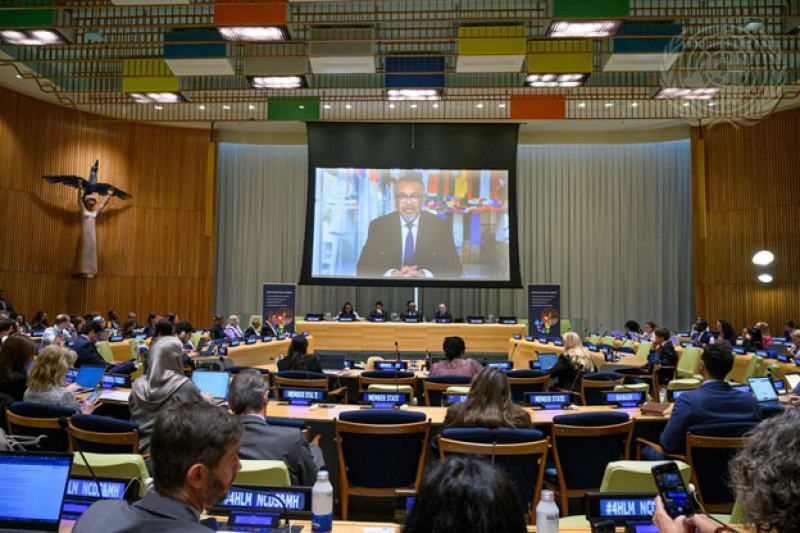- Puppet show enchants Children as Boi Mela comes alive on day 2 |
- DSCC Admin Salam’s drive to make South Dhaka a ‘clean city’ |
- 274 Taliban Dead, 55 Pakistan Troops Killed |
- Now 'open war' with Afghanistan after latest strikes |
- Dhaka's air quality fourth worst in world on Friday morning |
WHO Launches Health Taxes to Curb Tobacco and Sugary Drinks

Tedros Adhanom Ghebreyesus, Director-General of the World Health Organization (WHO), delivers a message to multi-stakeholders on the prevention and control of noncommunicable diseases.
On July 2, the World Health Organization (WHO) launched the “3 by 35” initiative to boost public health and limit global consumption of harmful substances. By urging governments worldwide to implement taxes on tobacco, sugary drinks, and alcohol, WHO seeks to reduce cases of noncommunicable diseases amid rising strains on health systems and shrinking development funding.
Through the initiative, WHO aims to introduce “health taxes” that would increase the prices of tobacco, sugary drinks, and alcohol by 50 percent by 2035. In addition to promoting healthier lifestyle choices, health and humanitarian experts hope these taxes will boost public revenue, which could be used to revitalize critical public sectors—especially in developing and lower-income countries facing declining aid.
WHO is optimistic these taxes could raise $1 trillion in revenue over the next ten years. “Health taxes are one of the most efficient tools we have,” said Dr Jeremy Farrar, Assistant Director-General, Health Promotion and Disease Prevention and Control, WHO. “They cut consumption of harmful products and create revenue governments can reinvest in health care, education, and social protection. It’s time to act.”
This follows the success of similar strategies worldwide. In 2017, Colombia imposed a tax on sugary beverages, resulting in a 22 percent decline in consumption and generating about USD 360 million annually, which was allocated to healthcare programs.
However, Vietnam’s recent efforts to increase taxes on alcohol and tobacco have yielded mixed results. In June 2025, the Vietnamese Parliament approved a tax increase on alcoholic beverages from 65 percent to 90 percent by 2031. Parliament is also considering a hybrid tax system on tobacco products, including a 75 percent Ad Valorem tax plus a fixed tax per pack.
The alcohol tax poses economic risks for Vietnam’s brewing industry, potentially causing job losses and revenue declines. Both taxes could also increase illicit trade and consumption of unregulated goods.
Despite pushback from beverage corporations, WHO insists the initiative will benefit public health long term. WHO points to previous tobacco taxes implemented by 140 countries between 2012 and 2022. In 2020, WHO estimated that about 1 billion people worldwide experienced health benefits from living in countries with high tobacco taxes.
According to WHO, consumption of sugary drinks, tobacco, and alcohol accounts for nearly 75 percent of global deaths, mostly from heart disease, cancer, and diabetes. The proposed taxes could prevent approximately 50 million premature deaths over the next 50 years.
Vietnam’s WHO Representative Dr Angela Pratt says such taxes are vital to securing a healthy future for younger generations, calling tobacco companies’ marketing tactics “manipulative.”
“We’ve seen this in Vietnam, especially with e-cigarettes and heated tobacco products, using flavours like watermelon, raspberry slush, and lemon tart that mask nicotine’s harshness, and bright packaging that attracts youth,” Pratt said. “Tobacco tax is like a vaccine against tobacco harms for young people—by stopping them from starting, we protect them for life.”
Yet many countries still provide tax exemptions and incentives to tobacco and beverage industries. To address this, WHO is uniting policymakers, stakeholders, and global partners to collaborate on international policies to reduce harmful consumption, raise awareness about health taxes, and empower healthcare systems worldwide.

